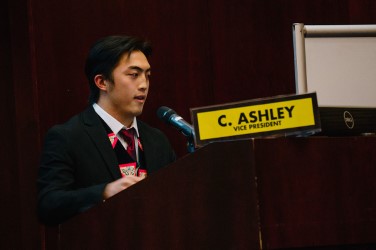Student Senate discusses pros and cons of the Trump rally
New legislation looks to address student concerns raised last Tuesday
More stories from Hillary Smith

Photo by Hillary Smith
Senator Justin Vue presented a compilation of student experiences and reactions following Trump’s visit to campus. The Senate will continue discussing these topics at next week’s meeting and vote on legislation intended to alleviate academic issues students had because of the rally.
The Student Senate engaged in conversation centered on a hot topic on UW-Eau Claire’s campus: The Donald Trump rally, which took place last Tuesday in Zorn Arena.
Senator Justin Vue delivered a presentation giving the Senate an overview of student reactions and experiences from the rally. He emphasized the intention was to inform in an objective, unbiased manner.
Students cited examples of hate speech, targeted harrassments and congestion inhibiting mobility because of the rally. Vue accompanied his summary with screenshots of social media posts students wrote criticizing the events and rhetoric on campus.
Vue said there was hateful speech coming from Trump supporters and rally protesters alike, but he doesn’t want last Tuesday’s events to prevent open conversation.
“Free speech is a good thing and it can bring about many pros and cons,” Vue said. “But I encourage that we learn and grow from each other and hear what we have to say.”
The Senate discussed several issues surrounding the rally, one of them being the blue emergency phones stationed around campus. Students may use the phones when they feel unsafe and would like a police escort to their destination.
An Eau Claire student used this station to request an escort to her car because she said she felt unsafe, but she was told no one was available because the rally took most of their manpower. The student recorded the incident and posted it on social media, sparking more criticism.
The Senate discussed concerns raised by the situation, particularly some misconceptions about the emergency phones. Student Body President Ashley Sukhu explained the calls are directed to a dispatch center in the city who then reroutes the call as they see fit.
Sukhu said they are trying to create an emergency hotline number students can call using their own cell phones, which could be a more effective system.
Another issue students faced was the congestion caused by the rally, which brought over 3,000 visitors to campus. Academic Affairs Director Nathan Altmann said students told him they did not feel safe on campus and did not attend class, thus receiving academic penalty.
Altmann presented a bill moving to excuse all absences for Nov. 1 due to, as outlined in the legislation, student concern for their safety, limited accessibility to academic buildings and overloaded campus parking capacity.
In addition, Altmann said the bill is an effort to acknowledge and try to “put a band-aid” on the difficulties students faced last Tuesday as well as a platform for conversation. He urged his fellow Senate members to approach the bill with an honest and constructive perspective.
“There is going to be temptation of individuals to attack this legislation in a way that is seeking its destruction and not construction of something to help students,” Altmann said.
Though the bill was presented at this week’s meeting, Altmann said he is seeking more clarification with the legislation and is waiting to converse more with administration. The bill will be reintroduced and discussed at the next meeting.
The events surrounding the rally have been largely perceived as negative, but Senator Branden Yates said he wants people to recognize the positive aspects that accompanied Trump’s visit to campus.
Yates said it’s not often so many prominent political leaders converge on Eau Claire’s campus and Trump’s visit may inspire other major speakers to consider coming to Eau Claire in the future.
“I thought if we’re going to talk about all these cons we should talk about all the good it brought,” Yates said. “It was a Trump rally but there was a lot more than just Trump there.”
He also said the rally brought conservative perspectives to campus, prompting new conversation angles the campus does not often see.
Sukhu said she wants students to talk about controversial topics on campus, which is more productive than making hateful remarks. Rather than generalize and marginalize groups of people, she said she wants students to learn from one another.
“I know it’s been hard and it’s certainly left a very deep mark on a lot of people but it’s also hard to recognize that hate speech is protected by the First Amendment,” Sukhu said. “It doesn’t mean that it’s okay; it doesn’t mean that anyone ever should. No one should be told that they don’t belong on our campus.”
